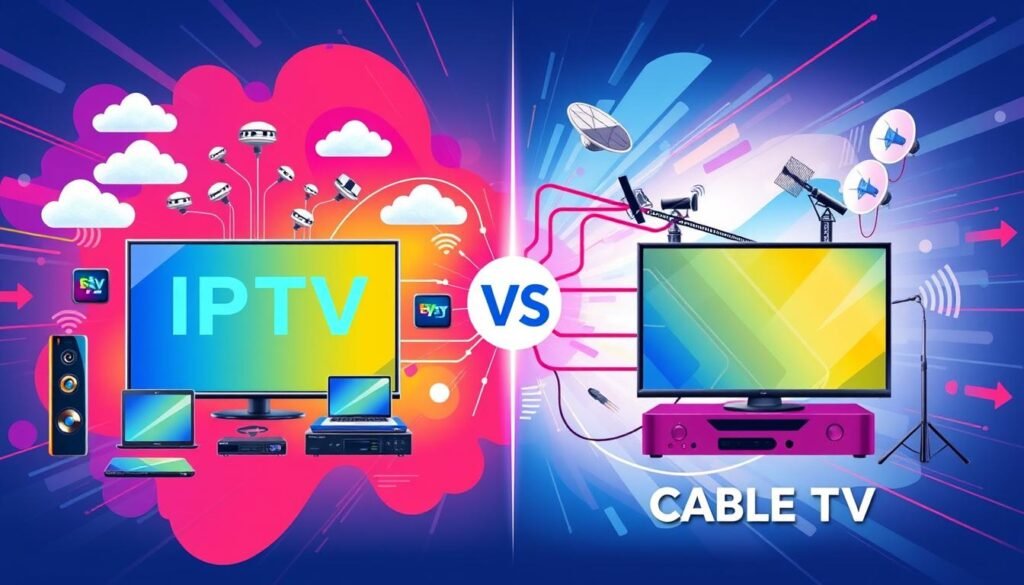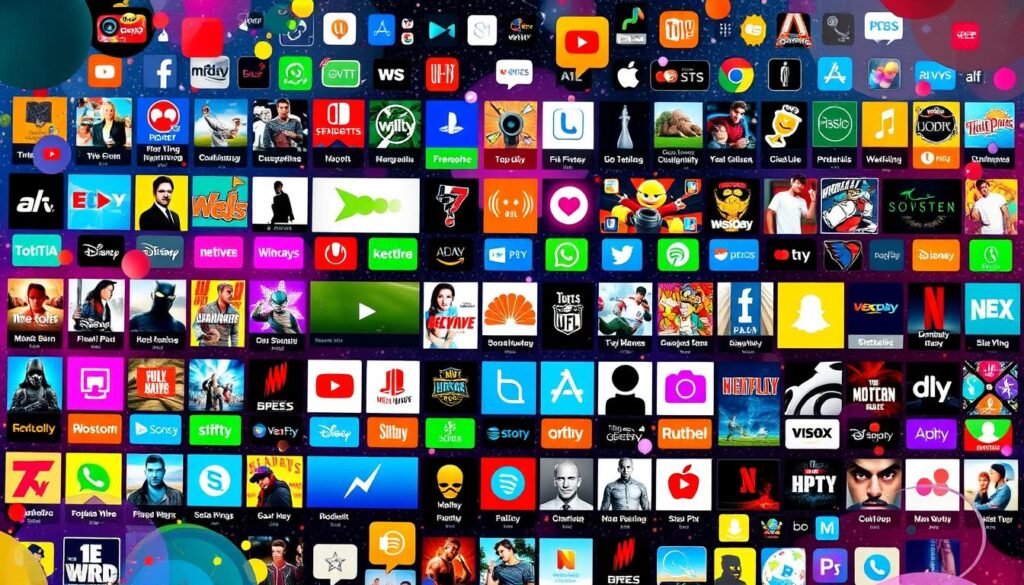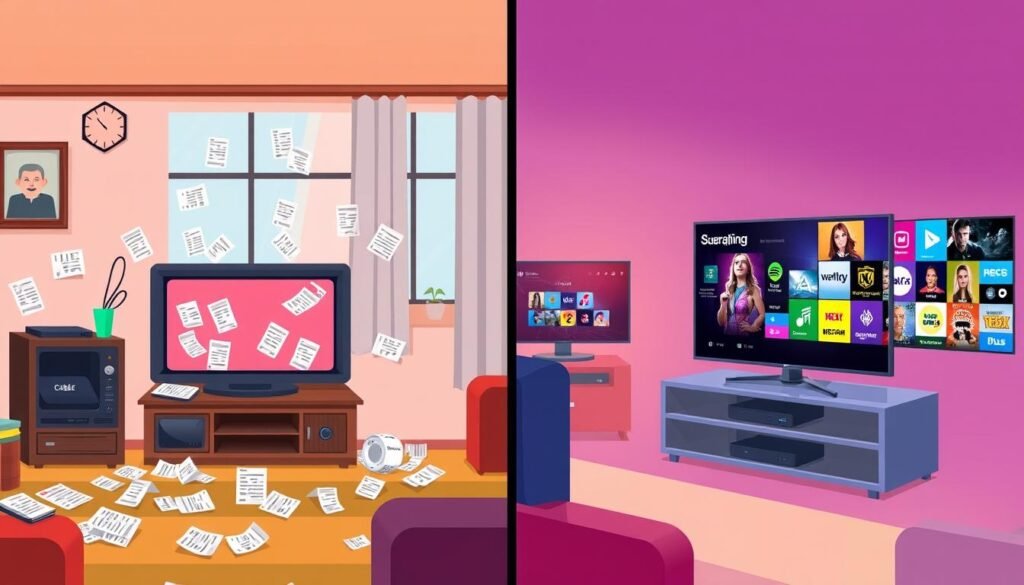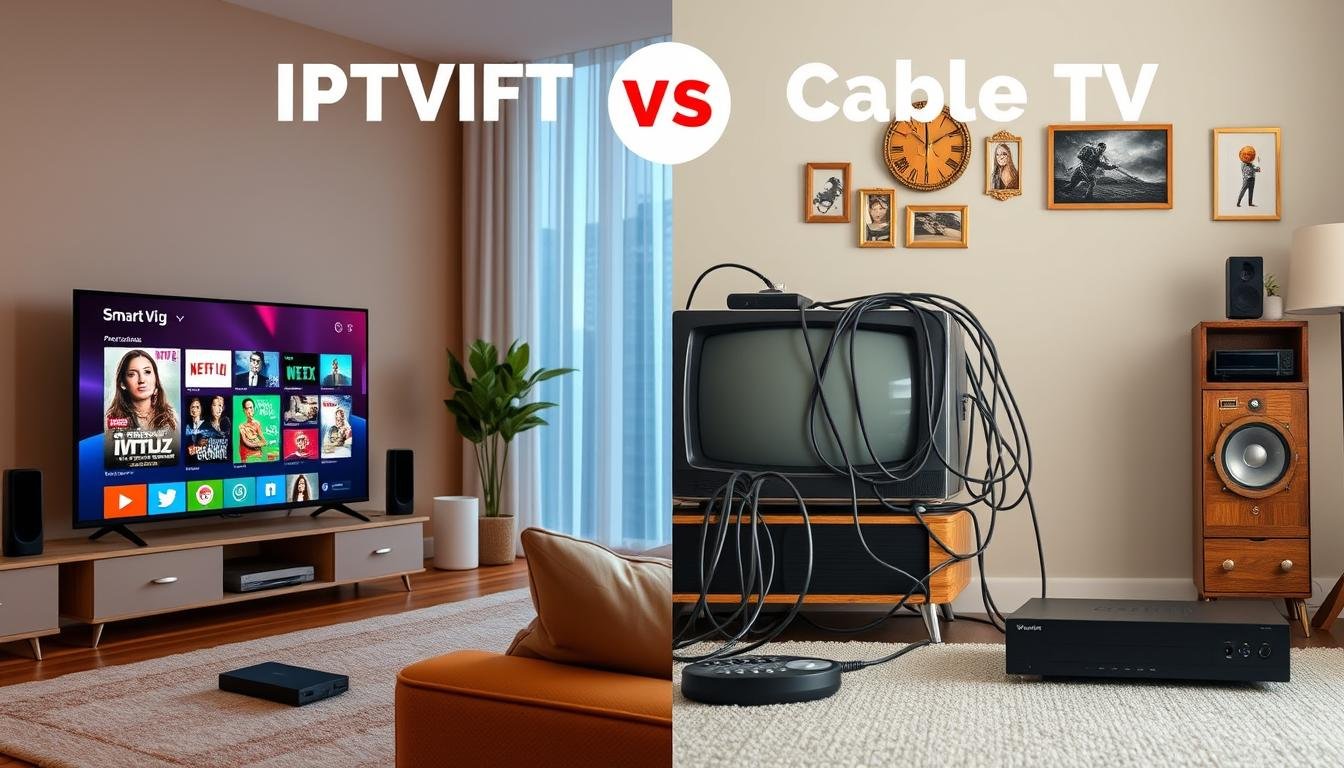IPTV vs cable TV: The world of home entertainment is changing fast. The debate between Internet Protocol Television (IPTV) and traditional cable TV is getting more important. In the UK, people want to get the most out of their TV watching. This article will help you understand the differences between these two options.
If you love streaming services or over-the-top (OTT) platforms, or if you’re thinking about cutting the cord, this guide is for you. We’ll look at the main differences in content libraries, subscription models, internet connectivity requirements, streaming quality, and how flexible and portable each option is.
Key Takeaways
- IPTV and cable TV have different benefits, like content, cost, and flexibility.
- Content libraries and exclusivity vary, with IPTV offering more choices and on-demand options.
- Subscription models and pricing differ, affecting the total cost of the services.
- Internet connectivity is key, with IPTV needing a stable, high-speed connection.
- Streaming quality, buffering, and resolution can differ, impacting your viewing experience.
Understanding IPTV and Cable TV
In the world of video entertainment, IPTV and cable TV are two main options. Knowing the differences between them helps you choose the best for your home.
What is IPTV?
IPTV uses the internet to deliver video content. It’s different from cable TV, which needs cables. IPTV lets you watch what you want, when you want, on many devices.
What is Cable TV?
Cable TV has been a top choice for decades. It uses cables to bring channels and shows to your TV. It’s known for its stable signal but has fewer channels than IPTV.
IPTV and cable TV differ mainly in how they work. IPTV needs a fast internet connection. Cable TV uses its own network. This affects how you watch, what you can watch, and the cost.
The video entertainment world is changing fast. Knowing about IPTV and cable TV helps you pick what’s right for you. It depends on what you like to watch, your budget, and your internet.
IPTV vs Cable TV: Key Differences
Choosing between IPTV and cable TV requires knowing the main differences. Both offer TV services, but the technology and user experience differ a lot.
Content Libraries: Expansive vs Curated
IPTV has a wider range of content. It offers a huge variety of on-demand shows, live channels, and exclusive content. Cable TV, however, has a more limited selection. It focuses on a few key channels and on-demand titles.
Subscription Models: Flexible vs Bundled
IPTV lets you pick what you want to pay for. You can choose specific channels or services. Cable TV, though, often requires you to buy a package of channels, even if you don’t watch them all.
Internet Connectivity: Dependence vs Independence
IPTV needs a good internet connection to work. This means it can be affected by internet problems. Cable TV, however, works without the internet. This makes it more reliable, especially in areas with poor internet.
Streaming Quality: Adaptive vs Fixed
IPTV adjusts the video quality based on your internet speed. This ensures a smooth viewing experience. Cable TV, on the other hand, has a fixed quality. This might not change even if your internet speed does.
Knowing these differences helps you choose the right option. Whether you prefer IPTV or cable TV, it’s important to think about what you want to watch, how much you want to pay, and your viewing needs.
| Feature | IPTV | Cable TV |
|---|---|---|
| Content Libraries | Expansive and diverse | Curated selection |
| Subscription Models | Flexible, customisable | Bundled packages |
| Internet Connectivity | Dependent on internet | Independent of internet |
| Streaming Quality | Adaptive, adjusts to bandwidth | Fixed, non-adaptive |

“The choice between IPTV and cable TV ultimately comes down to personal preference and lifestyle needs. Understanding the key differences can help consumers make an informed decision that best suits their entertainment requirements.”
Content Libraries: Variety and Exclusivity
When comparing cable TV and IPTV, the variety and exclusivity of content are key. Cable TV offers many channels for different interests. But, it can be limited by deals that restrict access to some shows or events.
Cable TV Content Offerings
Cable TV packages have lots of channels. This gives viewers a wide range of content. You can find local, national, and international channels, plus specialty networks for movies, documentaries, and kids’ shows. Many also offer video on demand services for easy access to on-demand content.
IPTV Content Offerings
IPTV services have a more diverse and flexible content library. They offer a huge range of live TV channels, on-demand videos, and exclusive content. IPTV partners with many content creators, giving a wider and more varied library than cable TV.
| Cable TV Content | IPTV Content |
|---|---|
| Comprehensive range of live TV channels | Extensive live TV channel selection, including local, national, and international options |
| Video on demand library with limited exclusivity | Extensive video on demand library with more exclusive content |
| Content limited by licensing agreements and exclusivity deals | Greater content variety and flexibility due to diverse partnerships |
In summary, cable TV has a big content library, but IPTV offers more variety and flexibility. IPTV gives access to more live TV channels, on-demand programming, and exclusive content. The choice between cable TV and IPTV depends on what you prefer in terms of variety, exclusivity, and convenience.

Subscription Models and Costs
When looking at cable TV subscription and IPTV subscription, the prices differ a lot. It’s important to know these pricing models to choose the right one for your family’s viewing and budget.
Cable TV Subscription Costs
In the UK, cable TV providers have various packages. Prices start at about £25 a month for basic channels. You also get extra features like on-demand and DVR. But, prices can go up fast if you add premium channels or extra services.
This can make your monthly bill over £50 or even £100.
IPTV Subscription Costs
IPTV subscriptions are often cheaper and more flexible. In the UK, you can find IPTV packages for as little as £10 a month. They offer a huge selection of live and on-demand content.
IPTV also lets you pick what you want, making it easier to fit your needs and budget.
| Feature | Cable TV | IPTV |
|---|---|---|
| Base Subscription Cost | £25 – £100+ per month | £10 – £40 per month |
| Customisation Options | Limited | Highly Flexible |
| On-Demand Content | Included in Premium Packages | Extensive Library |
| Equipment Costs | Cable Box Required | Minimal or No Equipment Needed |
Choosing between cable TV and IPTV depends on your budget, what you like to watch, and how important flexibility and customisation are to you. Knowing the subscription costs and pricing models helps you decide what’s best for your family.

IPTV vs Cable TV: Internet Connectivity Requirements
Choosing between IPTV and cable TV depends a lot on internet needs. Cable TV uses a physical cable, while IPTV needs a fast broadband connection. This is key for your viewing experience.
IPTV streams content over the internet. So, a good fibre optic or IPTV internet connectivity is vital. It ensures you watch without interruptions or poor quality.
Cable TV, on the other hand, uses its own network. This means it doesn’t rely as much on your internet. It’s often more stable and consistent than your home’s broadband.
| Feature | IPTV | Cable TV |
|---|---|---|
| Internet Connectivity Requirement | High-speed broadband, fibre optic internet | Coaxial cable connection, less dependent on internet |
| Streaming Quality | Dependent on internet speed and stability | Consistent quality, less susceptible to internet issues |
| Portability | Portable, can be accessed from anywhere with an internet connection | Stationary, tied to the physical cable connection |
The choice between IPTV and cable TV depends on your internet. If your internet is fast and reliable, IPTV might be best. But if your internet is slow or unstable, cable TV could be better.
Streaming Quality: Buffering and Resolution
When we talk about IPTV and cable TV, the quality of streaming is key. It affects buffering and resolution. Knowing these differences helps us choose better.
IPTV uses the internet, so it can be hit by internet problems. This might cause buffering, where the video stops to load more. Cable TV, with its own bandwidth, usually has fewer breaks.
But IPTV can stream in high-definition (HD) or even ultra-high-definition (UHD). Cable TV might not go as high because of its old infrastructure.
So, it’s up to you whether you want smooth viewing or top-notch video. Cable TV is good for a steady stream. IPTV is for those who want the best picture.
| Feature | IPTV | Cable TV |
|---|---|---|
| Buffering | Can be affected by internet connectivity and network congestion | Generally more stable due to dedicated bandwidth |
| Resolution | Capable of delivering high-definition (HD) and ultra-high-definition (UHD) content | May be limited to lower resolutions due to infrastructure constraints |
Choosing between IPTV and cable TV depends on what you want. Knowing their strengths and weaknesses helps you decide what’s best for you.
IPTV vs Cable TV: Flexibility and Portability
IPTV and cable TV have different strengths when it comes to flexibility and portability. IPTV lets users watch content on many devices like smartphones, tablets, laptops, and smart TVs. This means you can enjoy your favourite shows and movies anywhere, making it a very portable option.
On the other hand, cable TV is mainly for watching on your TV at home. While some cable services have apps or streaming options, it’s not as flexible as IPTV. This limits how you can watch your favourite shows.
| IPTV | Cable TV |
|---|---|
| IPTV flexibility and device compatibility allow for access on multiple devices, including smartphones, tablets, and laptops. | Cable TV flexibility is primarily limited to the television set in the home, with more restricted portability. |
| Viewers can enjoy their favourite content anywhere, providing a truly portable viewing experience. | While some cable providers offer mobile apps or streaming options, the overall portability is more limited compared to IPTV. |
IPTV’s flexibility and portability make it a great choice for those who want to watch content on the move. It’s perfect for people with busy lives or who travel a lot. They can keep up with their favourite shows and movies no matter where they are.
“The freedom to watch what I want, when I want, and where I want is a game-changer. IPTV has revolutionised my viewing experience.”
In the end, whether to choose IPTV or cable TV depends on what you need and like. The flexibility and portability of IPTV are important things to think about.
Over-the-Top (OTT) Platforms and Cord-Cutting
The rise of over-the-top (OTT) platforms has changed the UK’s TV industry. More people are choosing to “cut the cord” and switch to streaming services. These services are cheaper and easier to use.
Big names like Netflix, Amazon Prime Video, and Disney+ are leading the way. They offer lots of on-demand content for less than cable TV. This shift is a big challenge for cable TV companies, who need to keep up to stay relevant.
IPTV providers are seen as a possible answer. They mix cable TV and streaming services. By working with OTT platforms, IPTV gives users a smooth experience. They can watch a wide range of content on one platform.
Cable TV companies in the UK are trying to keep up by adding streaming services to their offerings. They want to give customers a better and more affordable entertainment experience. This could help them save money too.
The move from traditional TV to OTT and IPTV is ongoing. How well providers adapt and innovate will be key. They need to keep their customers happy in a competitive market.
Choosing the Right Option for Your Household
When choosing between IPTV and cable TV, think about what your household needs. Look at your content preferences, budget, and internet needs. This will help you decide what’s best for your family.
Assess Your Content Preferences
First, think about what you like to watch. Cable TV offers lots of channels and special shows. IPTV is great for on-demand content and streaming.
Consider Your Budget
IPTV is often cheaper than cable TV. It has flexible plans with lower monthly costs. Think about how much you want to spend on entertainment.
Evaluate Your Internet Connectivity
IPTV needs a good internet connection. Check if your internet is stable and fast. If not, cable TV might be better.
Prioritise Your Household Needs
Think about what your household really needs. Do you want to stream on many devices or prefer traditional TV? Choose the service that fits your family’s lifestyle.
| Factors to Consider | IPTV | Cable TV |
|---|---|---|
| Content Variety | Extensive on-demand and streaming options | Broad selection of live and linear channels |
| Subscription Costs | Generally more affordable | Often more expensive |
| Internet Connectivity | Requires a stable and reliable internet connection | Less dependent on internet quality |
| Flexibility and Portability | Allows for streaming on multiple devices | Typically tied to a physical set-top box |
By thinking about these points, you can choose the best option for your family. Whether it’s IPTV or cable TV, make sure it fits your budget and lifestyle.
Conclusion
In the UK, choosing between IPTV and cable TV depends on what you prefer, your household needs, and your budget. IPTV gives you a flexible and custom viewing experience. It has a huge content library and lets you stream on many devices. On the other hand, cable TV offers a reliable service with lots of channels and strong infrastructure.
When deciding, think about your internet, the content you want, how much you’ll pay, and how portable you need it to be. If you love modern tech and on-demand shows, IPTV might be for you. But if you want lots of channels and a stable service, cable TV could be better.
Choosing between IPTV and cable TV in the UK is about finding the right balance for you. Look at the main differences between these services. This way, you can pick what’s best for your family’s viewing pleasure.

